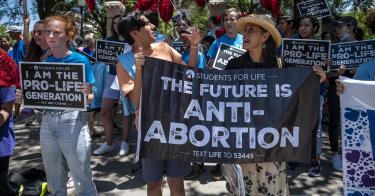Earlier this year, conservatives nationwide used a tremendous amount of powder targeting the Equality Act—and with good reason. The act represents an unprecedented left-wing power grab that would not only enshrine a new sexual orthodoxy but would unilaterally re-define federal anti-discrimination law.
Worse, it would eliminate Americans’ right to use the Religious Freedom Restoration Act (RFRA) to defend themselves against specious claims that they’ve discriminated against someone.
The Equality Act may be stalled at the moment, but it isn’t dead. And unbeknownst to many conservatives who heard much about the act, House and Senate Democrats have also introduced S.1021, the Equal Access to Abortion Coverage in Health Insurance Act (EACH Act), which would eliminate RFRA’s protection from efforts to expand so-called abortion rights.
Sponsored in the upper chamber by Sen. Tammy Duckworth (D-Ill.) and 28 of her progressive co-sponsors, the bill would require federal health care programs like Medicaid or the Federal Employees Health Benefit Plan to provide coverage for abortion services. It would also force federal facilities to provide access to those services—and, to pay for them, permit qualified health plans to use the Health Insurance Marketplace tax credit, which was designed to help low-income individuals afford health insurance. (Such use is currently prohibited by federal law.)
>>> 11 Myths About H.R. 5, the Equality Act of 2021
The EACH Act, now stuck in committee, employs an impressive collection of the Left’s favorite dog whistles, such as “systematic discrimination,” “intersecting oppressions” and “Black, Indigenous, and other People of Color (BIPOC).” And despite the fact that only biological women can conceive—and therefore obtain abortions—it includes the ever-perplexing “LGBTQ people.”
A companion bill, H.R. 2234, has been introduced in the House by Rep. Barbara Lee (D-Calif.) and 163 co-sponsors. It was recently referred to the Subcommittee on Health by the Committee on Veterans’ Affairs.
The EACH Act would be problematic alone for its proposal to guarantee abortion services at federal facilities and by way of federal programs. But, as is the case with other bills proposed in the 117th Congress, it appears to be yet another attempt to codify Roe v. Wade.
In that regard, it joins the Women’s Health Protection Act, which was introduced (for the second time) by Sen. Richard Blumenthal (D-Conn) last month. More recently, House Democrats advanced a spending bill for the Department of Health and Human Services without including the traditional Hyde Amendment ban on federal funding of abortions.
Together, these bills form a nefarious trio: one requires federal health care programs and facilities to cover abortion, one ensures taxpayer dollars flow to abortion providers, and one invalidates virtually all state limitations on abortions, thereby codifying abortion policy on a national level.
Pair this with the EACH Act’s explicit denial of RFRA protection for employees who refuse to participate in the termination of unborn life based on their religious beliefs, and the stage has been set for another battle royale.
Conservatives must again set their sights on Capitol Hill in order to not only protect the unborn but to defeat renewed efforts to eliminate RFRA—an act once so popular and bipartisan in nature that it passed both chambers of Congress nearly unanimously after being introduced by Sen. Chuck Schumer (D-N.Y.) in 1993.
>>> The Religious Freedom Restoration Act: History, Status, and Threats
Now that the Supreme Court plans to review Dobbs v. Jackson Women’s Health Organization in its fall term—a case in which the high court will determine whether any pre-viability restrictions on abortion are unconstitutional—the EACH Act more clearly tips the Left’s hand on issues related to abortion policy. The bill not only intensifies the Left’s calls for abortion expansion but reminds Americans that many people, including members of Congress, believe that religious faith should be practiced only behind the church house door.
With the EACH Act’s explicit exemption from RFRA’s application, thoughtful Americans might more easily recognize that, despite assertions to the contrary, abortion advocacy has never been about “safe, legal, rare.” It’s about party lines and progressive activism.
It’s about demanding that all Americans assent to the view that it is okay to treat unborn lives as nothing more than a disposable inconvenience—a view all Americans should reject.
This piece originally appeared in The Washington Times



